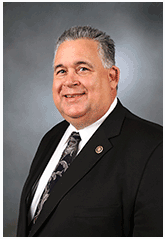It’s hard to believe that my first session as a state senator is nearly halfway over. The hurried pace of business at the Capitol always seems to make time pass by unusually fast. Not this week. This week, everything seemed to slow down a bit as a sense of sadness hung in the air, and the reality of last week’s events continued to sink in.
On Tuesday (3-3), I joined many of my colleagues in attending the funeral of Missouri State Auditor Tom Schweich, who unexpectedly passed away last Thursday, Feb. 26. Auditor Schweich’s eulogy was given by his close friend and mentor, former U.S. Sen. John Danforth.
I can say with utmost sincerity that Mr. Schweich was a brilliant and dedicated public servant. In the time I got to know Tom, my admiration for his honesty and conviction grew, and his willingness to assist me with my endeavors is something I will always remember. I ask everyone to continue keeping all of Tom’s family and friends in your thoughts and prayers.
Supporting the Ft. Leonard Wood Community
On Monday evening, I joined fellow members of the Missouri Senate in traveling to the Ft. Leonard Wood Army Installation for a Community Listening Session. Along with more than 2,000 others in attendance, we spoke out against the potential loss of 5,400 military and civilian jobs over the next five years. The proposed cuts are part of the U.S. Army’s broader plan to reduce their current number of forces by as much as 150,000 by 2020.
Fort Leonard Wood is Missouri’s 5th largest employer, supporting 36,400 direct and indirect jobs. What began as a small training post 70 years ago has since grown into a premiere Army Center of Excellence that trains 80,000 to 90,000 military and civilian personnel each year. Combined, Missouri’s military bases are worth more than $40 billion. This year alone, Fort Leonard Wood’s military construction program will inject another $264 million into the local economy. This is an economic growth engine we cannot afford to lose.
As legislators, we are dedicated to seeing that these jobs remain in Missouri’s communities. I hope the presence of so many community members, lawmakers, state department officials and public university representatives showed the federal government just how committed Missouri is to the future of Fort Leonard Wood.
Legislative News
On Wednesday, the Senate Seniors, Families and Children Committee heard Senate Bill 380, legislation I filed establishing a committee to assess the continuation of the Money Follows the Person Rebalancing Demonstration Program (MFP), which provides support for Missourians who have disabilities, and those who are aging, to transition from institutional care to home- and community-based services (HCBS). Currently, 43 states and the District of Columbia participate in MFP programs.
Deciding where and how to live is a highly personal and important decision that we should be able to make for ourselves, as opposed to being determined for us by a physical disability or age. By eliminating certain barriers that restrict the use of Medicaid funds, the MFP program aims to give seniors and physically disabled citizens a choice in where they will receive their long-term care.
If passed, the committee will be tasked with exploring cost savings, possible program improvements and the extent to which the MFP program is achieving its purposes, as well as investigating the continuation of the program beyond its current demonstration period.
Also heard in committee on Wednesday, Senate Bill 392 would allow fraternal benefit societies to provide limited incentives for member recruitment without requiring members to become licensed insurance producers.
A fraternal benefit society is a nonprofit membership organization that has a representative form of government. It is owned by and accountable to its members, who use its earnings to support local community service activities. The Knights of Columbus, of which I’m a fourth degree member, is one example of a fraternal benefit society.
According to a 2010 Georgetown University study, when looking at all 70 fraternal benefit societies across the U.S., our country receives an annual benefit of $3.4 billion in charitable contributions and social capital. In 2011 alone, members of fraternal benefit societies contributed more than 84 million volunteer service hours and more than $380 million in donations to their communities.
Because of the vast amount of charitable work done by fraternal benefit societies, state statute generally exempts them from provisions of the insurance code. For example, we already allow many officers and representatives of fraternal benefit societies to solicit memberships without being licensed as insurance producers. Senate Bill 392 replaces the current limitations for member recruitment and allows fraternal benefit society members to recruit new members without being licensed, provided they write no more than $50,000 in life insurance or recruit more than 25 members in a calendar year.
Please visit Sen. Wieland’s official Missouri Senate website at www.senate.mo.gov/wieland. |



